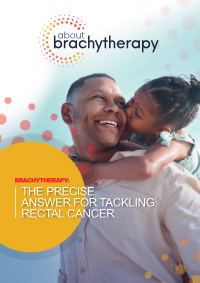
How effective is brachytherapy in treating rectal cancer?1,2,3
Clinical findings have consistently demonstrated the effectiveness of rectal brachytherapy, especially HDR brachytherapy, in treating rectal cancer. Studies have shown high tumor control rates and favorable outcomes, particularly when combined with other treatment modalities such as surgery and chemotherapy.
A 50% increase in survival rates has been reported when brachytherapy is combined with other treatments for rectal cancer. This combination therapy has shown significant effectiveness in improving patient outcomes and increasing the chances of survival compared to treatments without brachytherapy.
Can I choose whether I have a low dose rate or a high dose rate of brachytherapy to treat my rectal cancer?
This will depend on several factors, including how advanced your tumor is and what treatments are available at your hospital. Discuss which options might be best for you with your doctor or other healthcare professional.

Will the brachytherapy procedure hurt?
For most patients with rectal cancer, HDR brachytherapy is a well-tolerated procedure with some discomfort but without pain.
How will I know if brachytherapy has worked?
After your procedure, you will be scheduled for regular appointments to check that the tumor is responding to the treatment.
What are the side effects of brachytherapy in the treatment of rectal cancer?
All treatments for rectal cancer carry a risk of side effects. Side effects of brachytherapy can include problems passing urine and bowel problems. Some men may find that their sexual function is affected. Read more about the possible side effects of brachytherapy.

How soon can I return to work after receiving brachytherapy?
After high-dose-rate brachytherapy, you may be able to return to work the following day if you feel good and are cleared by your doctor.
Can I just have brachytherapy alone to treat my rectal cancer?
Usually, brachytherapy is a part of the treatment protocol, which includes external beam radiation therapy and chemotherapy. Rectal brachytherapy can be used on its own in certain cases, particularly for early-stage rectal cancer or in patients who are not candidates for surgery or external beam radiation therapy. Your doctor will discuss your treatment with you.
If the cancer comes back, can I choose to have brachytherapy again?
Yes, this is possible. Brachytherapy can be used in case of cancer recurrence. Your doctor will recommend the most appropriate treatment or a treatment combination.

Brachytherapy:
The Precise Answer for Tackling Rectal Cancer
References
- Clinical application of high dose rate endorectal brachytherapy for patients with rectal cancer, T. Vuong et al.
- MORPHEUS Phase II-III study; a pre-planned interim safety analysis and preliminary results. Aurelie Garant et al.
- Neoadjuvant chemoradiotherapy with radiation dose escalation with contact x-ray brachytherapy boost or external beam radiotherapy boost for organ preservation in early cT2-cT3 rectal adenocarcinoma (OPERA): a phase 3, randomised controlled trial. J-P Gerard et al.

